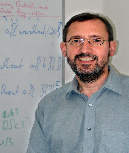Learn more
- Mar 13, 2008
KIWI Project Partners, Pt.1: LMU

The people on François’ KIWI team are: Norbert Eisinger, a senior researcher at the research unit for programming and modelling languages, Klara Weiand, a German doctoral student who did her master’s thesis in the Netherlands, Jakub Kotowski, a doctoral student hailing from Prague, and Ingeborg v. Troschke, supporting the team as an administrative assistant. Jakub wrote his master’s thesis about ontology engineering at Charles University, Prague. While working at Sun he developed a prototype for a semantic-web based project tracking tool. Klara put a focus on Artifical Intelligence, Computational Linguistics and Cognitive Psychology when studying toward a BSc at the University of Osnabrück, further pursueing this interest when doing an MSc in Artificial Intelligence with a focus on Language and Speech Processing at the University of Amsterdam.
The goals of LMU’s contribution to KIWI are:
- to develop a rule-based language that can be used by wiki users to specify queries and derivation rules, ideally in a simple and intuitive way
- to develop a reason maintenance component for this language that gives users an opportunity to understand why derivations exist and that allows for versioning of updates of the knowledge base